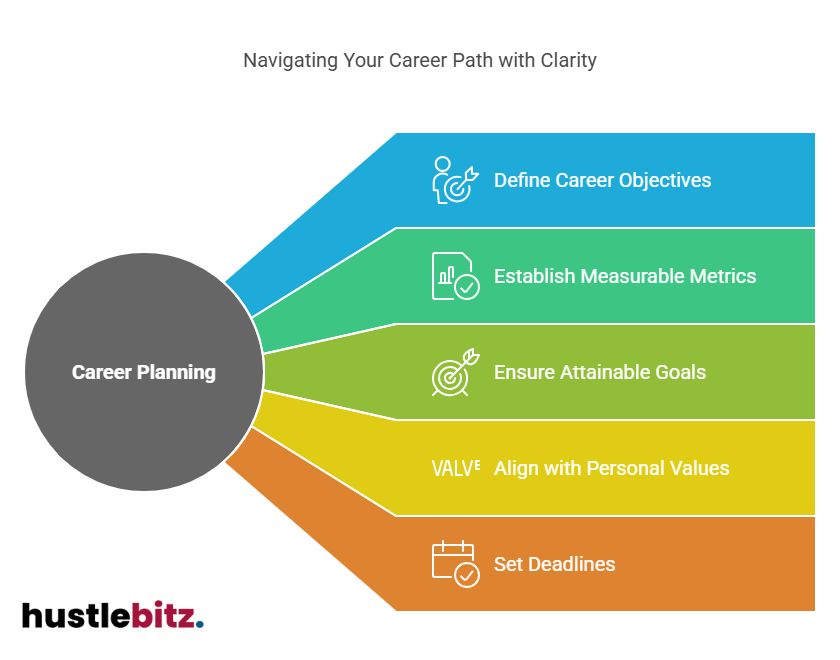Setting SMART career goals is crucial for driving personal growth and achieving significant success. By focusing on Specific, Measurable, Attainable, Relevant, and Time-bound criteria, you create a clear framework that enhances accountability and facilitates progress tracking. These goals align your actions with long-term aspirations while promoting skill development and a growth mindset. To effectively establish these goals, it’s important to define your objectives clearly, ensure they are realistic, and set a timeline for achievement. This structured approach not only propels you forward but also allows for regular evaluation of your progress, offering insights into your journey toward success. Further insights await for those eager to enhance their career strategy.
Key Takeaways
- Define specific career objectives to create a clear path towards desired achievements and outcomes.
- Establish measurable metrics to track progress and evaluate success throughout your career journey.
- Ensure your goals are attainable by balancing ambition with available resources and support.
- Align your career aspirations with personal values to maintain intrinsic motivation and relevance.
- Set deadlines to create urgency, enabling focused efforts and timely evaluations of your progress.

Understanding SMART Goals

Understanding SMART goals is essential for individuals seeking to create a clear and actionable framework that enhances their career development and success. The SMART criteria—Specific, Measurable, Attainable, Relevant, and Time-bound—serve as a powerful guide to establishing specific measurements for your aspirations. By defining attainable objectives, you can ensure that your goals are not just dreams, but actionable targets that inspire progress.
When setting SMART goals, it is crucial to identify measurable outcomes that provide tangible evidence of success. This approach allows individuals to implement effective progress tracking mechanisms, ensuring that they remain aligned with their professional development ambitions. By focusing on relevant aspirations, one can foster a sense of purpose and motivation that drives action.
Incorporating time-bound deadlines into goal alignment enhances accountability, urging individuals to take decisive steps toward their objectives. This structure not only clarifies expectations but also cultivates a sense of urgency that can be pivotal in maintaining momentum. Additionally, employing motivation strategies tailored to personal goals can further strengthen commitment to the process.
Ultimately, the use of SMART goals equips individuals with the necessary tools to evaluate their success metrics effectively. By adhering to this framework, professionals can navigate their career paths with clarity and confidence, empowering them to achieve their desired level of freedom and fulfillment.
The Role of SMART Goals to Success

SMART goals play a pivotal role in guiding individuals toward measurable success in their career endeavors. By establishing specific, measurable, achievable, relevant, and time-bound objectives, professionals can align their actions with their broader vision, paving the way for personal growth and career advancement. This structured approach enhances vision clarity, allowing individuals to focus on what truly matters while fostering motivation enhancement.
Key aspects of SMART goals include:
- Goal Alignment: Ensuring that professional aspirations resonate with personal values and long-term objectives.
- Progress Tracking: Monitoring advancements to maintain momentum and make necessary adjustments.
- Accountability Partnerships: Collaborating with peers or mentors to share progress and foster a sense of responsibility.
- Performance Measurement: Evaluating outcomes to identify strengths and areas for improvement.
Furthermore, SMART goals facilitate skill development by encouraging continuous learning and adaptation. This structured methodology not only promotes effective time management but also nurtures a growth mindset.
As individuals navigate their career paths, they can leverage SMART goals to enhance their overall performance, ensuring a clear trajectory towards success. By committing to this framework, individuals cultivate resilience and adaptability, crucial traits in today’s dynamic professional landscape.
Embracing the SMART goal approach empowers individuals to realize their aspirations, transforming potential into actionable success.
Creating Your SMART Goals
Establishing effective SMART goals requires a thoughtful process that integrates personal aspirations with actionable steps to achieve career success. The SMART framework—Specific, Measurable, Achievable, Relevant, and Time-bound—serves as a robust foundation for creating targeted career objectives. To transform your aspirations into reality, begin by defining specific objectives that clarify what you want to achieve.
Next, establish measurable outcomes to evaluate your progress. This could involve quantifying skills gained or milestones reached. Ensure your targets are achievable, considering your current resources and capabilities while challenging yourself to grow. Align your goals with relevant aspirations that resonate with your long-term vision, fostering intrinsic motivation. Lastly, implement time-bound plans to create urgency and structure around your objectives.
Here’s a simple framework to guide your goal-setting process:
| SMART Criteria | Strategies for Implementation |
| Specific Objectives | Clearly define your desired outcomes. |
| Measurable Outcomes | Set metrics for tracking progress. |
| Achievable Targets | Ensure goals are realistic and attainable. |
| Relevant Aspirations | Align goals with your career vision. |
| Time-bound Plans | Establish deadlines for accountability. |
Incorporating motivational strategies and reflective practices throughout your journey will enhance your focus and adaptability. Progress tracking is crucial; it not only allows you to celebrate small wins but also provides insights for necessary adjustments. Using alignment techniques, ensure that your goals harmonize with your overall career trajectory, setting the stage for long-term fulfillment and success.
Overcoming Common Challenges
Navigating the journey of setting and achieving career goals often presents various challenges that can hinder progress and motivation. To overcome these obstacles, individuals must adopt strategic approaches that foster resilience and adaptability.
A primary challenge is managing time effectively. By prioritizing tasks and implementing robust time management strategies, you can allocate your resources more efficiently to focus on what truly matters.
The fear of failure frequently looms large, creating mental barriers that stifle ambition. Employing motivation techniques such as visualization and positive affirmations can combat this fear, allowing you to reframe setbacks as opportunities for growth. Additionally, seeking support through accountability partners can enhance your commitment to goals, helping you stay on track.
To further strengthen your path to success, consider integrating feedback mechanisms into your routine. Regular evaluations through skills assessments and self-reflection strategies can provide valuable insights, allowing you to adjust your goals as needed.
Key strategies for overcoming common challenges include:
- Prioritizing tasks to ensure focus on high-impact activities.
- Utilizing motivation techniques to maintain enthusiasm and drive.
- Engaging with accountability partners to foster commitment and responsibility.
- Maintaining work-life balance to prevent burnout and promote overall well-being.
Final Thoughts
Setting SMART career goals is a powerful way to steer your career toward long-term success. By ensuring that your goals are specific, measurable, achievable, relevant, and time-bound, you can create a clear path for personal and professional growth. Overcoming common challenges like time management and fear of failure is possible with the right mindset and strategies. Stay committed, track your progress, and celebrate small victories along the way. With consistent effort and reflection, your SMART goals will not only guide your career advancement but also enhance your overall sense of purpose and fulfillment.




